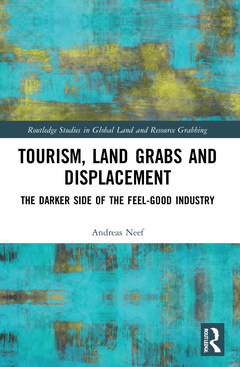Tourism, Land Grabs and Displacement The Darker Side of the Feel-Good Industry Routledge Studies in Global Land and Resource Grabbing Series
Auteur : Neef Andreas

This book examines the global scope of tourism-related grabbing of land and other natural resources.
Tourism is often presented as a peaceful and benevolent sector that brings people from different cultural backgrounds together and contributes to employment, poverty alleviation, and global sustainable development. This book sheds light on the lesser known and much darker side of tourism as it unfolds in the Global South. While there is no doubt that tourism has been an engine of economic growth for many so-called developing countries, this has often come at the cost of widespread dispossession and displacement of Indigenous and non-indigenous communities. In many countries of the Global South, tourism development is increasingly prioritised by governments, businesses, international financial institutions and donors over the legitimate land and resource rights of local people. This book examines the actors, drivers, mechanisms, discourses and impacts of tourism-related land grabbing and displacement, drawing on more than thirty case studies from Latin America and the Caribbean, sub-Saharan Africa, South and Southeast Asia, the Middle East and the Southwest Pacific. The book provides solid grounds for an informed debate on how different actors are responsible for the adverse impacts of tourism on land rights infringements, what forms of resistance have been deployed against tourism-related land grabs and displacement, and how those who have violated local land and resource rights can be held accountable.
Tourism, Land Grabs and Displacement will be essential reading for students and scholars of land and resource grabbing, tourism studies, development studies and sustainable development more broadly, as well as policymakers and practitioners working in those fields.
1. Introduction: Tourism in the Global Land Grab Debate 2. Tourism-Related Land Grabs: Actors, Drivers and Discourses 3. State-Led Tourism Development, Tourism Zoning and Customary Land Rights 4. Corporate Resort Development, Residential Tourism and Resource Grabbing 5. Tourism Expansion, Land Grabbing and Resistance in Post-Disaster Contexts 6. Tourism, Dispossession and Erasure in Conflict Zones and Post-Conflict Contexts 7. Wildlife Tourism, Fortress Conservation and Green Grabbing 8. Cultural Heritage Tourism: Beautification, Gentrification, Eviction 9. The Displacement Effects of Sports Mega-Events and Large-Scale Tourism Infrastructure Development 10. Tourism-Related Land Grabs: Mechanisms, Practices, Impacts and Resistance 11. Instruments and Guidelines for Land Governance and Protection from Dispossession and Displacement: Potential Applications in the Field of Tourism 12. Conclusion and Outlook
Andreas Neef is Professor in Development Studies at the University of Auckland, New Zealand and co-editor of The Tourism-Disaster-Conflict Nexus (2018). With Chanrith Ngin, he edits the Routledge Studies in Global Land and Resource Grabbing book series.
Date de parution : 05-2023
15.6x23.4 cm
Date de parution : 05-2021
15.6x23.4 cm
Thèmes de Tourism, Land Grabs and Displacement :
Mots-clés :
UN; Land Grabs; Development-induced displacement; Tourism Development; Violated local land; Urak Lawoi; Resource rights; Violated; Angkor Archaeological Park; Garifuna Communities; Carp; Great Limpopo Transfrontier Park; Serengeti National Park; African Development Bank; Transnational Tourism Corporations; Resource Grabbing; Disaster Capitalism; IPRA; Involuntary Resettlement; Economic Land Concession; LTTE; Community Based Tourism Initiatives; Tourism Sector; Large Scale Land Acquisitions; Street Vendors; NGO Representative; Marine Protected Areas; Van Noorloos



